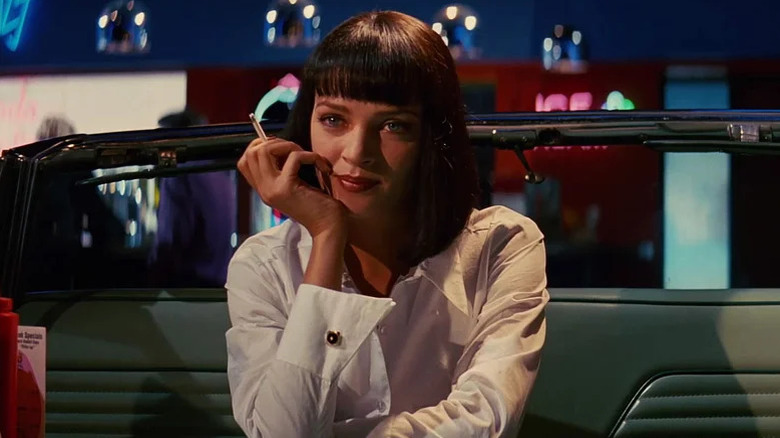What Does Pulp Fiction Mean? The Title Of The Quentin Tarantino Movie, Explained
Unconventional filmmaker Quentin Tarantino made a splash and changed modern filmmaking with his fast-talking, ultra-violent 1992 debut "Reservoir Dogs," but it was 1994's "Pulp Fiction" that really put him on the pop-culture map. Featuring a who's-who of Hollywood, "Pulp Fiction" helped resurrect John Travolta's career and catapulted Uma Thurman and Samuel L. Jackson onto the A-list while also showcasing actors like Bruce Willis and others in an ultra-hip, sometimes shocking, multi-layered crime thriller.
But what exactly does "Pulp Fiction" mean? Tarantino took his title from a mid-20th century style of racy, sensationalized stories that appeared in low-quality fiction magazines, often called "pulps" because they used ragged-edged wood pulp paper instead of the standard high-quality, glossy paper. The director used his art-house style and modern filmmaking techniques to bring these scrappy stories to life on the big screen, mainly focusing on gritty crime and vulgar, even gross, violence.
With two hitmen (Travolta and Jackson) at the core, the complex, non-linear storyline intertwines several character arcs, including a mob boss' wife (Thurman), a boxer (Willis), and a pair of thieves (Tim Roth and Amanda Plummer) who are all on an unexpected collision course with violence, redemption, and each other. The script could have come right out of the pages of one of the magazines that Tarantino sought to emulate.
Pulp Fiction paid homage to cheap, lurid stories people used to read
The opening scene of Quentin Tarantino's "Pulp Fiction" offers two dictionary definitions of "pulp," one of which includes a brief explanation of the old-time magazines, which were known for quickly cranking out fast-paced, scruffy stories that featured graphic violence, bare-knuckled dialogue, eye-catching illustrations, and hard-boiled lifestyles.
Those rough-cut magazines can arguably be seen as a predecessor of comic books, using the same short, striking style and evocative imagery — and Tarantino's "Pulp Fiction" is no different. The director, whose unique cinematic takes were bred out of video-store-clerk geekdom, turned to his love of those old pulp stories to help him string together his own over-the-top, interwoven tales of crime and capers filled with segmented scenes, snappy dialogue, and shocking violence.
The endeavor proved insanely successful, with "Pulp Fiction" becoming the first indie film to rake in over $200 million worldwide, off a budget of approximately $8 million, during an age where reaching $100 million made a movie a bona fide blockbuster. It is arguably Tarantino's career-defining work, placing him in the pantheon of contemporary filmmakers who have helped redefine cinema.

